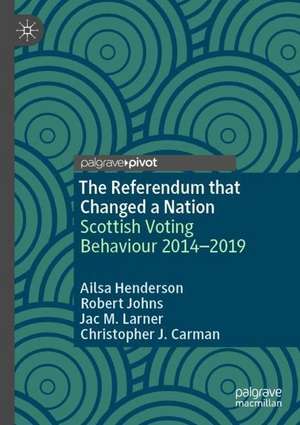The Referendum that Changed a Nation: Scottish Voting Behaviour 2014–2019
Autor Ailsa Henderson, Robert Johns, Jac M. Larner, Christopher J. Carmanen Limba Engleză Hardback – 29 noi 2022
Preț: 320.17 lei
Nou
Puncte Express: 480
Preț estimativ în valută:
61.26€ • 66.76$ • 51.62£
61.26€ • 66.76$ • 51.62£
Carte disponibilă
Livrare economică 02-16 aprilie
Livrare express 18-22 martie pentru 33.16 lei
Preluare comenzi: 021 569.72.76
Specificații
ISBN-13: 9783031160943
ISBN-10: 3031160940
Pagini: 201
Ilustrații: XIV, 201 p. 43 illus., 2 illus. in color.
Dimensiuni: 148 x 210 x 20 mm
Greutate: 0.41 kg
Ediția:1st ed. 2022
Editura: Springer International Publishing
Colecția Palgrave Macmillan
Locul publicării:Cham, Switzerland
ISBN-10: 3031160940
Pagini: 201
Ilustrații: XIV, 201 p. 43 illus., 2 illus. in color.
Dimensiuni: 148 x 210 x 20 mm
Greutate: 0.41 kg
Ediția:1st ed. 2022
Editura: Springer International Publishing
Colecția Palgrave Macmillan
Locul publicării:Cham, Switzerland
Cuprins
1. Studying Referendums and Voting in Scotland.- 2. The 2014 Referendum Campaign.- 3. How Voters Reacted to Campaign Cues.- 4. Explaining Referendum Vote Choice.- 5. Two Earthquakes or One?.- 6. Electoral Behaviour 2014 to 2019: The Multi-Level Voter in Scotland.- 7. How the Referendum Changes Scotland: Engagement, Polarisation and Losers' Consent.- 8. Conclusion.
Notă biografică
Ailsa Henderson is Professor of Political Science at the University of Edinburgh, UK.
Robert Johns is Professor of Politics at the University of Essex, UK.
Jac M. Larner is Lecturer in Politics at Cardiff University and Research Fellow at the University of Edinburgh, UK.
Christopher J. Carman is Stevenson Professor of Citizenship at the University of Glasgow, UK.
Textul de pe ultima copertă
“This book is short but very sweet, in electoral analysis terms. You can pick this book up and read it in one sitting, gain a ton of fascinating insights you didn’t know, gain a depth of understanding about referenda in general and the Scottish referendum in particular, and learn lessons from the 2014 independence referendum and what has followed with all the implications still to come. Accessible and careful scholarship at its best.”
—Jane Green, Professor of Political Science, University of Oxford, UK
“This outstanding book provides a wonderfully detailed but accessible analysis of the lasting significance of a seismic event in Scottish – and UK – politics, the 2014 independence referendum. Packed with informative and authoritative data, The Referendum that Changed a Nation is a must-read for anyone who wants to enhance their understanding of contemporary Scottish politics and a constitutional debate which will not disappear anytime soon.”
—Jon Tonge, Professor of Politics, University of Liverpool, UK
Drawing on data from the Scottish Referendum Study and subsequent Scottish Election Studies, this book provides the first in depth analysis of how voters engaged with the independence referendum in 2014 and what impact this has had on vote choice, polarisation and engagement in Scotland since then. The book contains eight chapters, and discusses how voters engaged with the referendum campaign, explains vote choice by examining reactions to the cues of parties, leaders and events, and compares the importance of these to calculations about risk.
Ailsa Henderson is Professor of Political Science at the University of Edinburgh, UK.
Robert Johns is Professor of Politics at the University of Essex, UK.
Jac M. Larner is Lecturer in Politics at Cardiff University and Research Fellow at the University of Edinburgh, UK.
Christopher J. Carman is Stevenson Professor of Citizenship at the University of Glasgow, UK.
—Jane Green, Professor of Political Science, University of Oxford, UK
“This outstanding book provides a wonderfully detailed but accessible analysis of the lasting significance of a seismic event in Scottish – and UK – politics, the 2014 independence referendum. Packed with informative and authoritative data, The Referendum that Changed a Nation is a must-read for anyone who wants to enhance their understanding of contemporary Scottish politics and a constitutional debate which will not disappear anytime soon.”
—Jon Tonge, Professor of Politics, University of Liverpool, UK
Drawing on data from the Scottish Referendum Study and subsequent Scottish Election Studies, this book provides the first in depth analysis of how voters engaged with the independence referendum in 2014 and what impact this has had on vote choice, polarisation and engagement in Scotland since then. The book contains eight chapters, and discusses how voters engaged with the referendum campaign, explains vote choice by examining reactions to the cues of parties, leaders and events, and compares the importance of these to calculations about risk.
Ailsa Henderson is Professor of Political Science at the University of Edinburgh, UK.
Robert Johns is Professor of Politics at the University of Essex, UK.
Jac M. Larner is Lecturer in Politics at Cardiff University and Research Fellow at the University of Edinburgh, UK.
Christopher J. Carman is Stevenson Professor of Citizenship at the University of Glasgow, UK.
Caracteristici
Provides the first comprehensive analysis of vote choice in the Scottish independence referendum Challenges widely-held assumptions about what mattered during the campaign, and what has happened in Scotland afterwards Compares the impact of the independence referendum to the impact of the Brexit referendum
